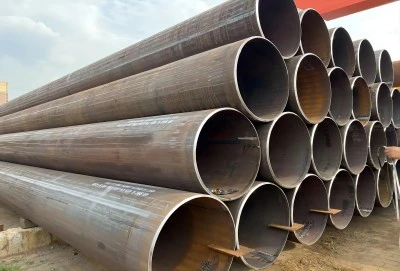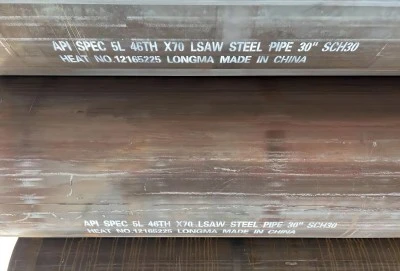Cost-Effectiveness Compared To Seamless Pipes
API 5L welded pipes represent a significant cost advantage in pipeline construction projects. The manufacturing process utilizes steel coil or plate materials, which undergo forming and welding operations to create the final pipe product. This production method requires less raw material compared to seamless pipe manufacturing, resulting in lower material costs and reduced energy consumption during production.
The welding technologies employed in modern pipe manufacturing facilities have evolved substantially, enabling the production of high-quality welded pipes that meet stringent performance requirements. Advanced welding processes such as Electric Resistance Welding (ERW), Submerged Arc Welding (SAW), and High-Frequency Welding (HFW) produce consistent, reliable weld seams while maintaining competitive production costs.
Material optimization during welded pipe production contributes to cost savings through efficient use of steel. The ability to precisely control wall thickness and utilize optimized steel grades helps minimize material usage while meeting performance specifications. Additionally, the welding process allows for better control of dimensional tolerances, reducing material waste and associated costs.
Transportation and handling costs also favor welded pipes due to their typically lighter weight compared to seamless alternatives of similar size and pressure rating. The reduced weight impacts the entire supply chain, from factory shipping to on-site handling and installation, generating cumulative cost benefits for project stakeholders.
|
|
|
Availability And Versatility In Sizes
API 5L welded pipes offer extensive size ranges that accommodate diverse project requirements. Manufacturing capabilities typically span from small diameter pipes suitable for distribution networks to large diameter transmission pipelines. The welding process enables the production of pipes with diameters ranging from 2 inches to over 100 inches, providing flexibility in system design and application.
Wall thickness variations can be readily accommodated in welded pipe production without significant manufacturing process modifications. This adaptability allows manufacturers to produce pipes meeting specific pressure ratings and loading conditions while maintaining production efficiency. The ability to adjust wall thickness helps optimize material usage and meet project-specific requirements.
The availability of different end preparations, including plain ends, beveled ends, and special threading options, enhances the versatility of welded pipes. These various end configurations facilitate different joining methods and application requirements, providing engineers with multiple installation options. The manufacturing process accommodates custom length requirements, optimizing transportation efficiency and reducing field joining operations.
Production capacity for welded pipes typically exceeds that of seamless pipes, ensuring better availability and shorter lead times for large projects. Multiple manufacturing facilities worldwide maintain substantial production capabilities, reducing supply chain risks and enabling competitive pricing through market competition.
Manufacturing Speed And Efficiency
Modern welded pipe manufacturing employs automated production lines that integrate multiple operations, including forming, welding, heat treatment, and inspection. Advanced process control systems maintain consistent quality while achieving high production rates. The continuous nature of welded pipe production enables manufacturers to meet demanding project schedules and volume requirements.
Quality control measures embedded throughout the manufacturing process ensure compliance with API 5L specifications. Automated inspection systems, including ultrasonic testing, radiographic examination, and hydrostatic testing, verify product integrity without impeding production flow. Real-time monitoring and adjustment of welding parameters maintain consistent weld quality and minimize defects.
Heat treatment processes, crucial for achieving required mechanical properties, integrate seamlessly into the production line. Modern facilities utilize sophisticated temperature control systems and cooling methods to optimize metallurgical properties while maintaining production efficiency. The controlled cooling processes ensure uniform material properties throughout the pipe length.
Surface treatment and coating applications complement the manufacturing process, providing corrosion protection and enhancing pipe performance. The integration of coating operations within the production facility streamlines logistics and ensures proper surface preparation and coating application under controlled conditions.
High Strength For Certain Applications
API 5L welded pipes achieve high strength characteristics through careful material selection and controlled manufacturing processes. Advanced steel grades, combined with precise welding procedures, produce pipes capable of operating under demanding service conditions. The weld zone properties match or exceed base material requirements through optimized welding parameters and post-weld heat treatment.
Mechanical properties, including yield strength, tensile strength, and impact toughness, meet stringent API 5L requirements across various grade specifications. The manufacturing process enables the production of high-strength grades such as X70 and X80, suitable for high-pressure transmission applications. Quality control measures verify mechanical properties through systematic testing programs.
Fatigue resistance and fracture toughness characteristics receive particular attention during welded pipe production. The welding process parameters and post-weld treatments ensure adequate performance under cyclic loading conditions. Material selection and processing considerations address specific application requirements, including low-temperature service and sour service conditions.
Structural integrity assessment methods validate the performance capabilities of welded pipes under various loading conditions. Engineering analysis and testing programs demonstrate the suitability of welded pipes for critical applications requiring high strength and reliability.
China API 5L Welded Pipe Supplier
LONGMA GROUP maintains comprehensive certification credentials, including API 5L, ISO, and Quality Management System certifications. These certifications demonstrate commitment to quality standards and manufacturing excellence in welded pipe production. Regular audits and compliance assessments ensure continued adherence to certification requirements and industry standards.
The manufacturing facility incorporates advanced production equipment and quality control systems to meet international market demands. Skilled personnel and technical expertise support the production of high-quality welded pipes meeting diverse customer specifications. The quality management system ensures consistent product quality through documented procedures and process controls.
Technical support services assist customers in product selection and application considerations. The engineering team provides guidance on material selection, specification requirements, and installation practices. Documentation packages include material certificates, testing reports, and quality compliance records supporting product traceability and regulatory compliance.
For inquiries regarding API 5L welded pipe products and specifications, interested parties may contact LONGMA GROUP at info@longma-group.com. Technical specifications, delivery capabilities, and certification documentation are available upon request.














